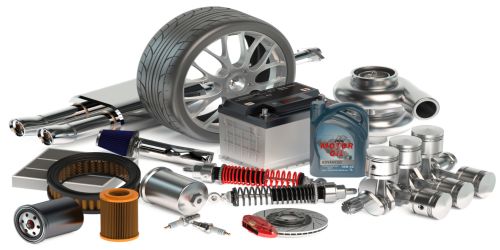
A Financial Outlook on the Auto Parts Industry
Advertisement
The auto parts industry plays a pivotal role in the automotive ecosystem, serving as the backbone for vehicle maintenance and repair. As we navigate the ever-evolving landscape of the global economy, it's crucial to examine the financial dynamics influencing this sector. From market trends to technological advancements, understanding the key factors at play can provide valuable insights for investors, businesses, and enthusiasts alike.
Market Overview:
The global auto parts industry has experienced steady growth in recent years, driven by factors such as increasing vehicle ownership, a growing global population, and rising disposable incomes. According to industry reports, the market is projected to witness a compound annual growth rate (CAGR) of around 3.5% over the next five years.
Consumer Trends:
Consumers are becoming increasingly inclined toward vehicle maintenance and customization, contributing to the demand for high-quality auto parts. As the average age of vehicles on the road continues to rise, there is a parallel surge in the need for replacement parts, creating opportunities for both original equipment manufacturers (OEMs) and aftermarket suppliers.

E-commerce Impact:
The digital revolution has significantly impacted the auto parts industry, with a noticeable shift toward online purchasing. E-commerce platforms have become popular choices for consumers seeking convenience and a wide range of options. This trend presents both challenges and opportunities for traditional brick-and-mortar stores, emphasizing the importance of an omnichannel strategy for businesses operating in this sector.
Supply Chain Challenges:
The auto parts industry, like many others, has faced disruptions in the global supply chain. Factors such as geopolitical tensions, natural disasters, and the COVID-19 pandemic have highlighted the vulnerabilities inherent in a complex and interconnected supply network. Companies are now reevaluating their supply chain strategies, with a focus on resilience and adaptability to mitigate future risks.
Technological Innovations:
Advancements in technology, particularly in the areas of electric vehicles (EVs) and autonomous driving, are reshaping the auto parts landscape. Electric vehicles, with their simplified drivetrains and reduced number of components, pose both challenges and opportunities for traditional auto part manufacturers. Companies that can adapt to the evolving needs of the industry, such as producing components for EVs or investing in smart technologies, are likely to thrive in the long run.

Sustainability and Environmental Regulations:
Increasing awareness of environmental issues has led to a growing emphasis on sustainable practices in the auto parts industry. Regulatory frameworks around the world are tightening emissions standards, driving manufacturers to develop eco-friendly solutions. Investors and consumers alike are showing a preference for companies committed to sustainability, pushing the industry toward cleaner and more responsible practices.
Financial Considerations for Investors:
For investors looking to navigate the auto parts industry successfully, several key financial considerations should be taken into account:
Diversification: Given the diverse nature of the auto parts market, investors should consider a diversified portfolio that includes both traditional and emerging players. This approach helps mitigate risks associated with market fluctuations and technological disruptions.

Research and Development Investment: Companies actively investing in research and development (R&D) to stay ahead of technological trends are likely to secure a competitive edge. Evaluating a company's commitment to innovation is crucial for long-term investment success.
Global Market Exposure: With the industry's global nature, companies with a strong international presence may be better positioned to weather regional economic fluctuations. A global footprint allows businesses to tap into emerging markets and diversify revenue streams.
Sustainable Practices: Investors are increasingly prioritizing environmentally conscious companies. Firms adopting sustainable practices not only contribute to a cleaner planet but also position themselves favorably in the eyes of consumers and investors.
Supply Chain Resilience: Given recent disruptions, assessing a company's supply chain resilience is essential. Businesses with robust and adaptable supply chain strategies are better equipped to navigate unforeseen challenges.
As we navigate the road ahead, the auto parts industry presents a dynamic landscape full of opportunities and challenges. By staying abreast of market trends, technological innovations, and global economic shifts, investors and businesses can make informed decisions to drive success in this ever-evolving sector. The intersection of consumer trends, sustainability, and technological advancements will continue to shape the future of the auto parts industry, creating an exciting and dynamic environment for all stakeholders involved.
Advertisement
Advertisement
- Previous article
- Understanding the Relationship Between Credit Scores and Personal Loans!
- Next article
- The Thrills of PUBG MOBILE
Advertisement
OTHER NEWS

Unleashing the Power of Cash Back Cards: Exploring the Best Options
BY Little Grapes

How to get an Auto Insurance Quote?
BY Little Grapes

How to invest during a recession?
BY Little Grapes

Unveiling the Charm of Stardew Valley: A Journey Through its Colorful Characters
BY Little Grapes

Perhaps you Should Purchase a Life Insurance Policy.
BY Wendy

The Best Time To Sell Your House!
BY Little Grapes
RECENT NEWS
-

Demystifying Bitcoin
-

Securing and Maintaining High Limit Credit Cards: A Comprehensive Guide!
-

The investment value of men’s watches
-

Guarding Against Credit Card Fraud: What to Do If Your Identity Is Compromised?
-

Strategies for Success in the Watch Industry
-

Understanding Survivorship Life Insurance: Planning for the Future Together!
 1
1 1
1